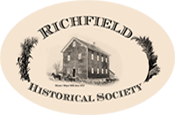Lofy General Store
For 47 years from 1921 to 1968, Lofy’s Grocery provided everything
from food and gasoline to notions, men’s overalls and shirts to
customers who lived in the St. Augustine neighborhood.
food and gasoline to notions, men’s overalls and shirts to
customers who lived in the St. Augustine neighborhood.
Mr. and Mrs. Lofy bought the store building which had been a cheese factory soon after their marriage in 1921 and decided that a general store was just what St. Augustine needed. Their store was located on the southwest corner of Highway 167 and St. Augustine Road.
At first their business was slow. So, Mrs. Lofy taught for a year at St. Augustine School. Soon people realized that the Lofy’s were trustworthy and their prices fair. Mr. Lofy installed two gas pumps and did minor, and some major, car repairs, often without charging.

The store had a glass case with millions of kinds of candy. Mr. and Mrs. Lofy had a soft spot for children and would slip children a piece of candy even if they didn’t have the penny that it cost.
Henry Mathias Lofy & Francis Jaworski Lofy at Lofy’s General Store
There were glass cookie jars  and wonderful cheeses and sausages.
Lofy’s was open from 7:00 a.m. to 9 p.m. every day but Sundays when the
store opened at 8:30 or 9:00 and stayed open until 1:00 p.m. Lofy’s
Grocery Store seemed a place where everyone had time to spend a few
minutes chatting and exchanging news.
and wonderful cheeses and sausages.
Lofy’s was open from 7:00 a.m. to 9 p.m. every day but Sundays when the
store opened at 8:30 or 9:00 and stayed open until 1:00 p.m. Lofy’s
Grocery Store seemed a place where everyone had time to spend a few
minutes chatting and exchanging news.
This Lofy family traces its ancestors to Nicolas Longfils & Jeanne de Benaux living in Chassepierre, Luxuembourg. Son Nicolas Longfils and wife Johanna moved to Morscheid, Germany and raised their family there. Morscheid is 24 miles east of Trier, Germany situated on the Moselle River, west of the Rhine River. Morscheid is adjacent to Luxembourg and the French Alsace-Lorraine area.
According to Morscheid church records, the Lofy surname had many spellings including “Loffie,” “Loffi,” and Loff, some used until 1818 and 1835. One explanation offered is that few 18th century people were able to write. Formal schooling was not in traduced into the Trier region until 1773. Once people began to write, the spelling of the family surname became uniform. It was 1818 with ancestor Johann Lofy and wife Maria Rosa that the spelling of “Lofy” was comfirmed.
(Our friend Herb Lofy is Henry Mathias Lofy’s 4th cousin. Henry Mathias Lofy is the 7th generation of Lofys.)
THE GENERAL STORE
Stepping into the incredible world of general stores brings you to
an  institution one of the strongest in American history. The real glory
days only lasted about 60 years and covered roughly 1879 to 1930.
During that time, the old stores served the crossroad villages, hamlets
and small towns throughout the populated United States.
institution one of the strongest in American history. The real glory
days only lasted about 60 years and covered roughly 1879 to 1930.
During that time, the old stores served the crossroad villages, hamlets
and small towns throughout the populated United States.
These general merchandise stores served as centers of trade to sparse populations, provided a popular meeting spot, frequently offered post office services and fulfilled a variety of other needs. In addition to fulfilling his major role as storekeeper, the enterprising merchant was often a politician, banker, accountant, lawyer, insurance representative and most importantly a genuine diplomat.
The owner of the general store had great knowledge of his customers, their likes and dislikes, problems and financial situations. This was vital knowledge since many transactions involved credit and barter. Many families survived on the goodwill and trust of the storekeeper during times of economic problems. The merchant also needed the ability to trade properly for country produce. Butter, eggs, honey, poultry, vegetables, fresh fruit, hides, chestnuts, black walnuts and feathers frequently found their way to store counters.
The general store was also a favorite place for those who seemed to
have nothing important to do and preferred sitting around the store
stove supplying stories and telling tall tales. When the weather became
more accommodating, “center stage” was adjourned to the front porch.
One of the classic happenings in a general store was this conversation,
or lack of it. A certain storekeeper was found talking to himself as a
man entered his store. When asked why he was talking to himself, he
curtly commented: “He had been looking for someone interesting to talk
to all day. And; thank heavens he had found one!”
nothing important to do and preferred sitting around the store
stove supplying stories and telling tall tales. When the weather became
more accommodating, “center stage” was adjourned to the front porch.
One of the classic happenings in a general store was this conversation,
or lack of it. A certain storekeeper was found talking to himself as a
man entered his store. When asked why he was talking to himself, he
curtly commented: “He had been looking for someone interesting to talk
to all day. And; thank heavens he had found one!”
It is difficult to put a value on the importance of the general store in the daily life of the community it served. It was considered vital as a provider of goods and services as well as a place to socialize and catch up on all the latest news.
By 1930, the golden age of the rural general store was coming to an end. The major factor was the extended use of the automobile and improved roadway systems. This broadened the shopping area of rural folk who could now visit towns and cities having a greater selection of merchandise. The general store along with the horse and buggy, once so important to daily life, would no longer be needed.
 |
 |
 |
|---|
(excerpted from “General Store Collectibles by David L. Wilson)
Enjoy our other stories

